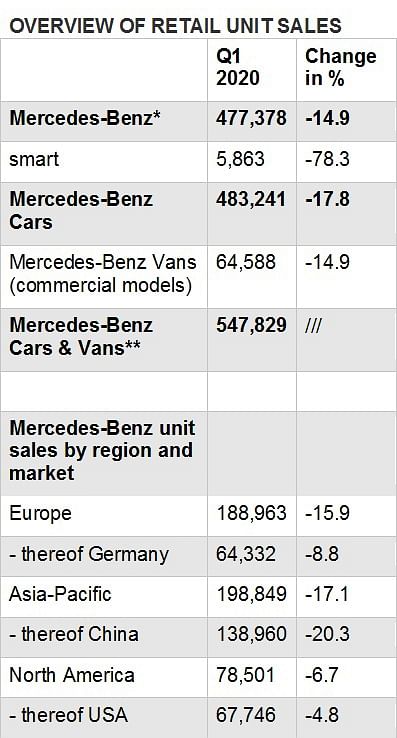Mercedes-Benz sells 477,400 cars worldwide in Q1 2020, down 15%
While 2020 opened with a significant increase in global sales, the Covid-19 pandemic has impacted sales in China, Mercedes-Benz's biggest market, as well as Europe and USA.
After a good start to the year in January, Mercedes-Benz ended the first quarter with worldwide retail unit sales of 477,378 cars (-14.9%).
Mercedes-Benz passenger cars and vans started 2020 with a significant increase in global deliveries. However, the pandemic developments in Europe and USA and the consequences of the temporary closures of retail businesses in those markets had a significant impact on unit sales in March. Despite the challenging conditions, the Mercedes-Benz Cars & Vans divisions sold a total of 547,829 units in the first quarter.
“The year 2020 started well and we were able to increase sales of our core model series especially in January. The impact of the corona crisis seriously weakened our unit sales already in March, and we therefore did not achieve our target numbers in the first quarter. Nonetheless, we achieved a very good result, especially in Germany. Customer feedback has been positive, and we are seeing right now the contribution our products make in our everyday lives – be it as ambulances, in service to the police or to delivery services and craftsmen. We will stay consistent on our course with regards to electric mobility and other future planning,” said Marcus Breitschwerdt, Head of
Mercedes-Benz Vans.
Mercedes-Benz unit sales by region and market
In Europe, 188,963 premium automobiles with the three-pointed star were delivered to customers in the first quarter (-15.9%). In Germany, Mercedes-Benz sold 64,332 cars in the months of January to March (-8.8%). In its domestic market, Mercedes-Benz was the premium car brand with the most new-car registrations in the first quarter, and performed better than the market.
In the Asia-Pacific region, the Stuttgart-based brand with the three-pointed star ended the first three month of the year with 198,849 premium vehicles sold (-17.1%). In its biggest market China, Mercedes-Benz sold 138,960 cars in the period from January to March, which is 20.3% below the high prior-year level. First-quarter deliveries in North America amounted to 78,501 vehicles. Mercedes-Benz delivered a total of 67,746 premium automobiles with the three-pointed star in the core market USA, making it the highest-selling premium brand in the USA from January to March (-4.8%).
For the smart brand, the phase-out of predecessor models and the switch to solely battery-electric driving had a strong impact on sales during the same period: Worldwide, 5,863 units of the smart brand were handed over to customers (-78.3%). Commercial vans unit sales (Citan, Vito and Sprinter) were also good in January and a total of 64,588 units were delivered in the first quarter (-14.9%).

*Including V-/X-Class
**Retail unit sales of the Mercedes-Benz Cars & Vans divisions are presented together for the first time in this press release on unit sales in the first quarter of 2020, so there is no comparative period.
RELATED ARTICLES
Autoliv Plans JV for Advanced Safety Electronics With China’s HSAE
The new joint venture, which is to be located strategically near Shanghai and close to several existing Autoliv sites in...
JLR to Restart Production Over a Month After September Hacking
Manufacturing operations at the Tata Group-owned British luxury car and SUV manufacturer were shut down following a cybe...
BYD UK Sales Jump 880% in September to 11,271 units
Sales record sets the UK apart as the largest international market for BYD outside of China for the first time. The Seal...






 By Autocar Professional Bureau
By Autocar Professional Bureau
 09 Apr 2020
09 Apr 2020
 9651 Views
9651 Views





 Ajit Dalvi
Ajit Dalvi




